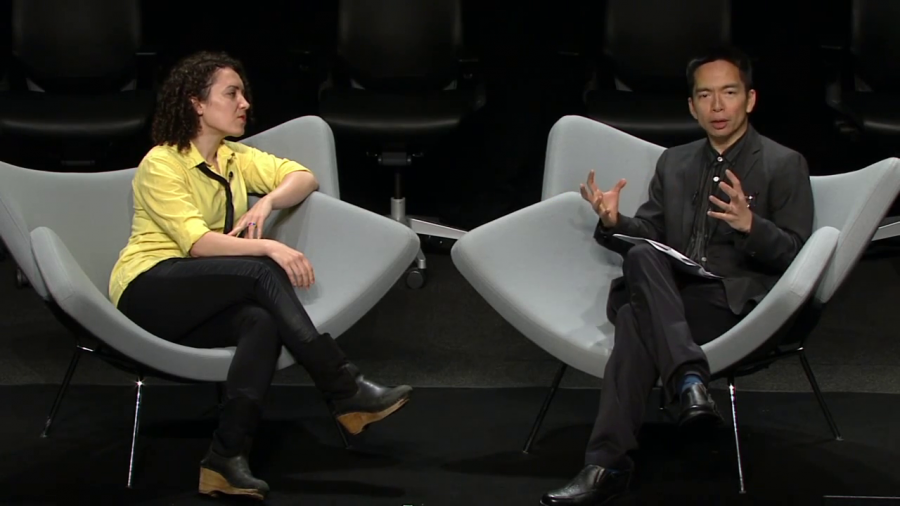John Maeda: Next up I’d like to bring onto the stage Maria Popova at the end of this session. Maria, thank you. Please sit down. So, how many people know or have touched a Brain Pickings piece of content? See, here you’re among your friends. It’s nice. And you’re color-coordinated.
If you’ve studied Maria’s work, it’s really gone counter to any kind of writing project. It hasn’t gone “viral” in that way. It’s going to become part of our culture, I believe. And in many senses, the same way that Paola [Antonelli], through her ability to see the world can really be a one-person institution, I see what Maria’s done is make an institution really out of your curiosity and fascination.
Maria Popova: That’s very generous. Thank you.
Maeda: It’s real, man. So, I just want to note, I love when you were talking about writing the other day. People think writing just happens, and there’s researching, too. Can you talk about how it isn’t as easy as sitting down and…typing away? Can you talk a bit about that, your process?
Popova: Well, I think reading and writing are really two forms of the same act, which is a discourse with one’s own mind, and ideally a discourse with another mind. As a reader it’s the author’s, and as a writer it’s the reader’s, you know. But the two sort of feed into each other, and for me writing is just a record of my own becoming.
So, Brain Pickings, which freakishly enough turns eight today, October 23rd. It’s the eighth birthday. So for eight years— [applause] Thank you. Totally unplanned. I realized this yesterday as we were driving up. But because it’s a record of my effort to understand myself, there is no divide between the reading and the writing. It’s all sort of this fluid way of sense-making, essentially. Which I think most writers do. It’s sort of an act of thinking in public, I guess.
Maeda: Nice. And because you were thinking in public, and you were able to really architect how that could become your way of life as a single sole businessperson, essentially, on the Internet, I was noticing how the Great Discontent people—
Popova: I love them.
Maeda: —have made their own self-publishing venture. Can you talk a bit about this? Is this a movement? Is this happening all over the place, or…
Popova: So, I get a little antsy when we talk about self-publishing as a sort of entrepreneurship thing, because I think before you can publish something you have to have something to say. That is, something to care about enough and to think about in public, and then that becomes the thing that you publish.
And what makes The Great Discontent— How many of guys know The Great Discontent? Not many. They do wonderful, pretty in-depth interviews with people in creative culture, and very thoughtful, and it’s a very sort of minimalist project. But it’s a husband and wife duo, very young, and they just do it because they give a shit. They care enough to do this in public, and they’ve been doing it for free since they started. And it grew a following, and they’ve interviewed— You know, they recently interviewed John, whose interview was amazing. They’ve interviewed every important person in design and creative culture that I can think of, you know, currently alive, obviously.
And the thing is with self-publishing, it needs to come from this place of giveashitness in order for it to be successful, right. Because otherwise it’s sort of shooting for an outcome without having the substance that propels it.
Maeda: You know, I’ve described Maria’s work as a kind of a one-person Harvard in how she is making the liberal arts exciting for everybody in a very democratic way. And I like “giveashitness.” Maybe Erin [McKean], can you add that to the lexicon? Will probably be the meme today. Thank you, Erin.
I want to note also, and I thank Maria for her contributions to the conference. Oftentimes you’ll have conferences that add different video segments. And I was hoping we could give give more of a shit about it. And I asked Maria to help us with that. So she hand-selected a lot of these little video vignettes that you’ll be seeing in the conference. So, can you please thank Maria for that extra effort for all of us.
Popova: And can I just debunk something that Linda said earlier about sleep?
Maeda: Okay. Yeah, go.
Popova: Sleep is so important. I sleep religiously. I think we live in a culture where the ability to get by on little sleep is some sort of testament to work ethic. But that’s so toxic. It’s a total failure of self-respect not to sleep. It’s not a badge of honor, you know. So, anyway.
Maeda: Give a shit, and get some sleep. And let’s go to break. Thank you guys.
Popova: Thanks.
